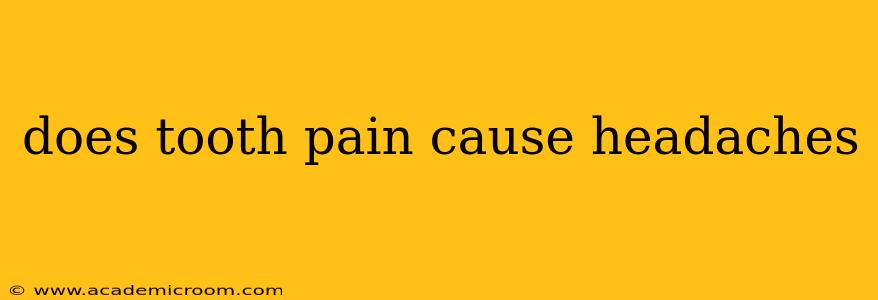Toothaches are undeniably unpleasant, often causing significant discomfort and interfering with daily life. But did you know that this pain can radiate beyond your mouth, sometimes triggering headaches? The connection between tooth pain and headaches is surprisingly common, and understanding this link is crucial for effective pain management. This comprehensive guide explores the relationship between toothaches and headaches, examining the causes, symptoms, and effective treatment strategies.
What Causes Headaches from Tooth Pain?
The most common reason tooth pain leads to headaches is referred pain. This occurs when the nerves responsible for sensing pain in your teeth and jaw are closely connected to the nerves that transmit pain signals from your head and neck. When your tooth experiences inflammation or injury, the pain signals can travel along these shared nerve pathways, causing pain to be perceived in your head, specifically the temples, forehead, or even behind your eyes.
The specific type of headache associated with tooth pain often resembles a tension headache or a sinus headache. Tension headaches are characterized by a dull, aching pain, often described as a tight band around the head. Sinus headaches feel like pressure or pain in the sinuses, located behind the cheeks and forehead. The similarity in location and type of pain can make it difficult to distinguish between a headache stemming from a dental issue and a primary headache disorder.
How Can I Tell if My Headache is Caused by a Toothache?
Differentiating between a headache originating from a dental problem and other headache types can be tricky. However, several clues can help pinpoint the source. Pay close attention to:
- Location of the pain: Does the pain originate in your teeth or jaw and then spread to your head? If the pain begins in your mouth, it's more likely linked to a dental issue.
- Type of pain: Is the pain throbbing, sharp, or dull? While both toothaches and headaches can present with varying pain characteristics, the sharp, shooting pain often associated with toothaches is a distinct indicator.
- Associated symptoms: Are there other symptoms, such as sensitivity to hot or cold, swelling in your gums, or a visible cavity? These are strong indications of a dental origin.
- Timing of the pain: Does the headache occur only when you experience tooth pain, or is it a separate issue? A consistent relationship between tooth pain and headaches strongly suggests a causal connection.
If you are unsure, it is crucial to seek professional advice from your dentist or doctor.
Can a Tooth Infection Cause Headaches?
Yes, a tooth infection (abscess) can most definitely cause severe headaches. An abscess is a collection of pus near the root of a tooth caused by an infection. This infection can cause significant inflammation and pressure, escalating the pain and making it more likely to spread to the head, resulting in intense headaches. A tooth infection requires immediate dental attention as it can lead to serious health complications if left untreated.
What are the Treatments for Headaches Related to Tooth Pain?
Treatment depends entirely on the underlying cause. Addressing the dental problem is crucial to relieving headache pain. This may include:
- Pain relief: Over-the-counter pain relievers like ibuprofen or acetaminophen can help manage the pain temporarily.
- Root canal: If the infection is deep within the tooth, a root canal might be necessary to remove the infected pulp and save the tooth.
- Extraction: In severe cases, the tooth may need to be extracted.
- Antibiotics: If an infection is present, antibiotics may be prescribed to combat the bacteria.
It's vital to consult your dentist for a proper diagnosis and tailored treatment plan. Ignoring the underlying dental problem will only lead to persistent headaches and potentially more severe complications.
My headache started after a dental procedure. What should I do?
Post-dental procedure headaches are not uncommon, and most often resolve on their own within a few days. However, if you experience severe or persistent pain, particularly if it is accompanied by swelling, bleeding, or other unusual symptoms, contact your dentist immediately. This could indicate a complication requiring prompt attention.
When should I see a doctor or dentist for headache and tooth pain?
Seek professional help if:
- Your headache is severe or persistent.
- Your tooth pain is intense or accompanied by swelling, fever, or difficulty opening your mouth.
- You notice any signs of infection, such as pus or throbbing pain.
- Over-the-counter pain relievers fail to provide relief.
- You are unsure of the cause of your headache or tooth pain.
Don't hesitate to contact a healthcare professional if you experience persistent headaches linked to tooth pain. Early diagnosis and treatment are essential for resolving the issue and preventing potential complications. Remember, seeking professional help is always the best approach when dealing with persistent pain.
